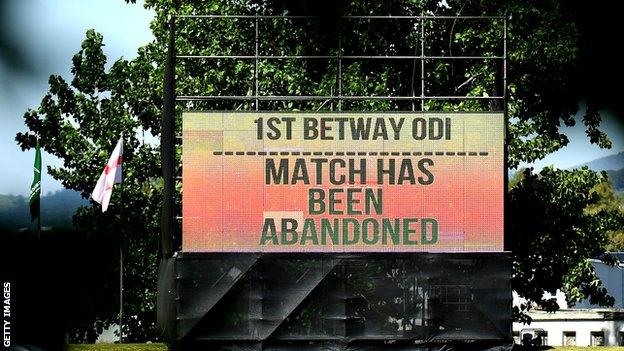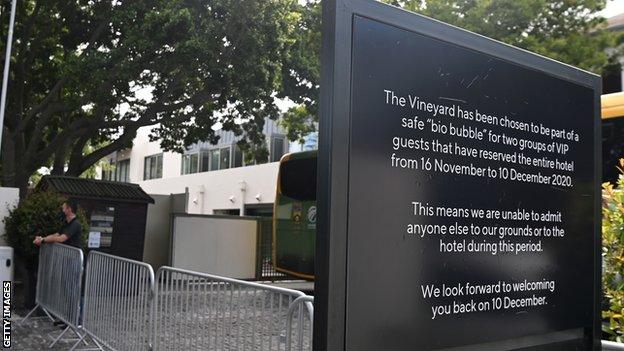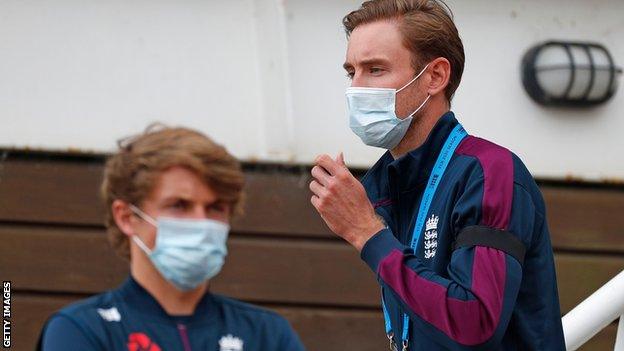England cricket: What next for bio-bubbles after South Africa tour abandoned?
- Published

England's three one-day internationals in South Africa have been postponed
After a weekend of being pricked with the needle of positive coronavirus tests, the bubble of England's tour to South Africa has burst.
The three-match one-day international series has been postponed, but the prospect of rearranging those games seems a minor problem compared to other issues that could arise, both short term and long term.
The best England can hope for at the moment is the two members of their party that have returned "unconfirmed positive tests" are actually free of coronavirus and will be able to leave South Africa with the rest of the squad.
If not, as well as the concern over their physical health, there will be questions over how long they must remain in Cape Town and the impact that might have on their mental wellbeing.
Even if the news is good, will players be quite so ready to put themselves in the 'bubble' environment in the future, especially with the England men's team set for two years of almost uninterrupted cricket in 2021 and 2022?
What has happened in South Africa?
After the rocky start of two South Africa players testing positive for coronavirus and two others being placed in isolation, a three-match T20 series, which England won 3-0, was unaffected.
However, it was on the morning of the first ODI last Friday that news of the bubble being compromised began to surface.
At this point, it is worth remembering that the arrangements were different to England's home summer, when hotels on grounds in Manchester and Southampton were used to house the players.
In South Africa, they stayed at The Vineyard Hotel in Cape Town, which the players only left to play and train at Newlands and in Paarl.
Friday's game was postponed after a positive test in the South Africa camp. A game on Sunday fell victim to two cases among hotel staff, after which England revealed their positive tests.
Though the tourists initially said they would wait for independent verification of those tests before making a decision on matches that could have potentially taken place on Monday, Tuesday or Wednesday, the tour was abandoned on Monday afternoon.
If England were feeling a responsibility to help South Africa by doing everything they could to get the games played, that goodwill might have worn thin when a leaked memo, external suggested their use of a particular set of nets at Newlands could be a potential source of the outbreak.
Now, England, and in particular the two individuals that have tested positive, face a nervous wait for the results of further tests which will not come until Tuesday at the earliest.
England say they will not leave until those results are known, but if they are positive, do the two affected face the lonely prospect of being left behind while the rest fly home? To his credit, England director of cricket Ashley Giles has said he and a member of the medical staff would remain with anyone who is stranded.
Some players are due to play in the Big Bash, where they are set for 14 days in quarantine on arrival in Australia, while England are due to travel abroad again on 2 January for a proposed tour of Sri Lanka.
The problems - physical, mental and logistical - could quickly escalate.

The South Africa and England squads have been staying in The Vineyard Hotel in Cape Town
What does this mean for bio-bubbles?
The issues in South Africa have further highlighted the magnitude of what was achieved in the English summer, when men's teams from West Indies, Pakistan, Australia and Ireland, and West Indies women, visited and completed series.
When there was a suggestion the bio-secure environment may have been compromised by Jofra Archer's trip home, he was dropped from a Test and confined to his hotel room to err on the side of caution.
England are not the only ones to have successfully formed a bubble, though. The Indian Premier League, the Caribbean Premier League and the Women's Big Bash have all been staged to a finish. Australia are currently hosting India and West Indies are in New Zealand.
It seems likely bubbles are here to stay too, especially for England's potential series against Sri Lanka and India, even if the latter ends up taking place in the United Arab Emirates.
While the numbers suggest the problems in South Africa would put it in the minority, that does not mean there will not be consequences.
For future tours, restrictions could be tightened, safety measures heightened, freedom further limited.
Might that mean players are less inclined to put themselves into a bubble, either because of their inconvenience or a mistrust of their effectiveness?
There are plenty of England players who have travelled to South Africa, quarantined, bubbled and followed all instructions to the letter, but not seen any competitive action.
Tom Banton and Tom Curran have already pulled out of the Big Bash because of bubble fatigue.
With a congested home summer, three Test tours, two limited-overs tours and a T20 World Cup due in 2021 alone, might some opt out of international commitments?
Are bubbles worth it?
That question could almost be "is playing cricket worth it?" because without the bubbles, there is no cricket.
First and foremost, the game needs action on the field to stay afloat. In the past summer, the England and Wales Cricket Board was open about potential losses of millions and millions of pounds had the men's national team not pulled in broadcast revenue.
The same will be true of every other national governing body, most of which are not as affluent as the ECB. The limited-overs matches against the Proteas were of huge financial benefit to Cricket South Africa, which will now count the cost of the lost ODIs.
Comparisons can be made to other sports, which seem to bump along quite nicely even if they are hit by positive tests. Football has had its fair share, and Lewis Hamilton was forced to miss the past weekend's grand prix.
But cricketers spend more time with their team-mates than in any other sport. Test matches take a week when you factor in practice days, while tours can be months long.
Perhaps there has to be a realisation that cricket's relentless schedule may need to be curbed because of the pandemic?
England's ODIs in South Africa have been "postponed", rather than cancelled. Even if space in a congested calendar can be found to play them in the future, and a bubble is necessary, is it better not to risk another puncture?

England's Sam Curran and Stuart Broad in the bio-secure environment of the home summer
What about the effect on individuals?
Though plenty of players have spoken about the challenges of bubble life, there is also acknowledgement they are fortunate to be doing what they do.
On the one hand, playing cricket for a living, being looked after in fancy hotels and filling your time with Call of Duty does not sound like a hardship.
So what if you have to remember to fill in a health check on your phone each morning, only ever eat at a table for one, have a mask almost permanently attached to your face, or that your movement is tracked by a chip worn around your neck?
At a time when the general public is being hit with periods of lockdown, not only worrying about the health of themselves and their loved ones, but also with many in fear of losing their jobs, for a professional cricketer to complain about his or her lot would be tone deaf.
However, sport, and cricket in particular, has learned many harsh lessons when it comes to neglecting players' mental health.
Thankfully, mental wellbeing became a primary concern even before bubbles were conceived. In the bubble era, players have praised the support they have received, or the freedom to opt out if they feel they need to.
Though the benefits of life as a professional athlete, even if that means some time alone in a hotel room, are obvious, there has to be an understanding that even the most luxurious setting can start to feel claustrophobic after weeks on end.
How frustrating would it be to put yourself in that situation, only for the bubble to be compromised, meaning you can't do the thing you were there to do in the first place?
Giles has said players will be offered "mental-health screening" before they commit to any further time in a bubble.
Still, the South Africa situation has shown bubbles can burst. Some players might decide they don't want to be around when they do.